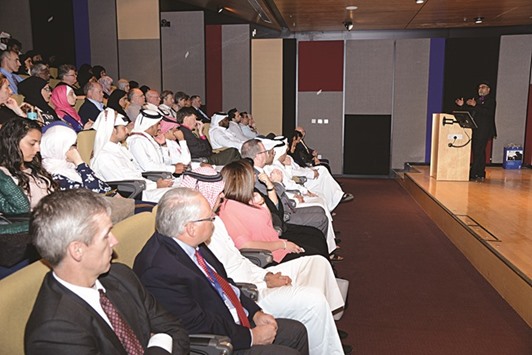Qatar’s economy will be resilient against global headwinds, according to Doha Bank CEO Dr R Seetharaman during a lecture at the College of the North Atlantic – Qatar (CNA-Q) entitled “The Changing Economic Landscape and Opportunities in the Banking Sector.”
Seetharaman said Gulf Co-operation Council (GCC) economies are expected to witness current account and fiscal deficit this year. He said Qatar’s growth in 2016 is expected to be 4.3%.
“Qatar has budgeted for revenues of QR156bn and expenditures of QR202.5bn in 2016. Health, education, and infrastructure accounted for the largest share of the 2016 budget. The fiscal deficit is expected to be covered by local and international debt issues. Qatar’s strong investable surplus will enable it to withstand adverse conditions,” Seetharaman explained.
Also, Seetharaman said Qatar’s banking sector “will be challenging” in the near term.
“However, Doha Bank will be cautiously optimistic with focus on balance sheet optimisation, cost optimisation, and repricing of assets. Doha Bank believes in sustainable performance as reflected in its performance ratios such as ROAA and ROAE.
“With liquidity continuing to be challenging, we will focus on low-cost deposit mobilisation. Doha Bank is a consistent performer despite the volatile market conditions. Doha Bank is an innovative bank and provides innovative solutions leveraging on technology for the benefit of the customer,” Seetharaman stressed.
Seetharaman said the global economy was expected to grow by close to 3% in 2015. He said the decline in growth reflects a further slowdown in emerging markets, partially offset by a modest pickup in activity in advanced economies.
“The US economy rate hike begun last December. However, economic recovery is uneven. Japan and Eurozone may still need more easing. Chinese economy grew by 6.9% in 2015. Chinese slowdown is a cause of concern to global economies.
“Brazil and Russia are also struggling, with India only showing growth. Global slowdown on account of struggle to accelerate in emerging economies and advanced economies are not recovering soon,” he said.
He added: “There are concerns among market participants both in advanced and emerging economies on the level of market liquidity. The prospect of rising interest rates in the US and an economic slowdown in China were contributing to uncertainty and a higher risk of economic vulnerability worldwide.”
Seetharaman also highlighted current trends in the global financial markets. He said: “Since the beginning of this year we have seen the global capital markets fall significantly on account of Chinese yuan devaluation and fall in oil prices.
“Oil prices below $30 per barrel have raised concerns of deflation and slowdown in global growth. The currency markets have also witnessed significant volatility. We are seeing funds moving towards safe haven such as Japanese yen and US treasuries. The risk of currency war has also emerged on account of yuan devaluation by Chinese Central Bank,” he said.
The lecture was hosted as part of Doha Bank’s ongoing efforts to engage Qatari students in dynamic discussions that enhance their understanding of economic and financial issues, with a view to develop the next generation of Qatari leaders in banking.
Doha Bank also runs a robust management trainee programme that aims at absorbing university graduates and putting them on a fast-track training programme. The programme focuses on equipping graduates with managerial skills to handle future leadership roles within the bank.

Seetharaman’s lecture in progress at the College of the North Atlantic u2013 Qatar (CNA-Q) in Doha.
